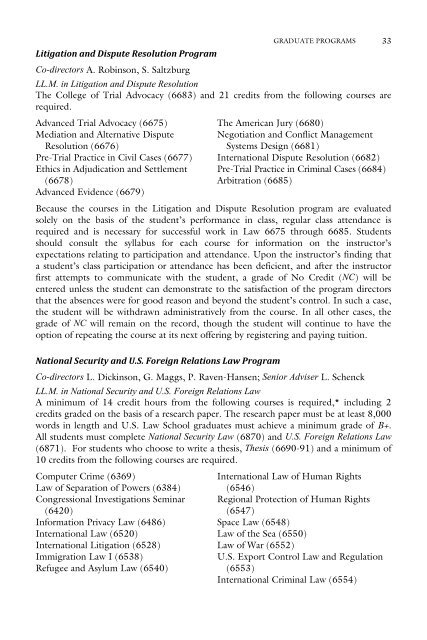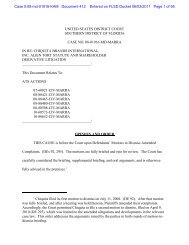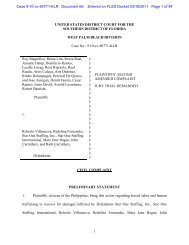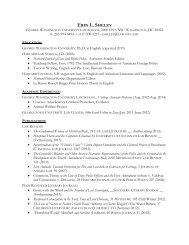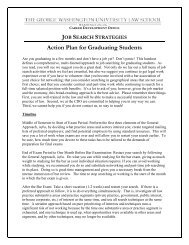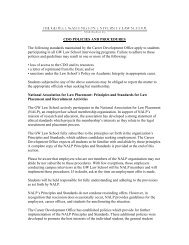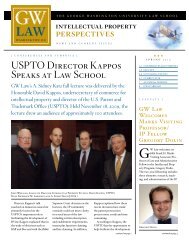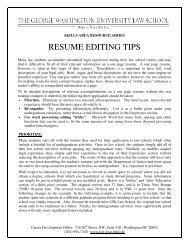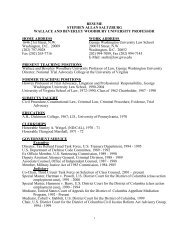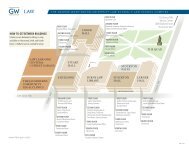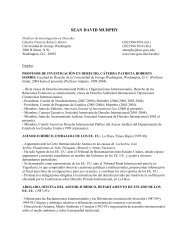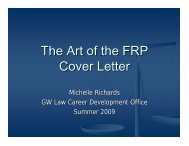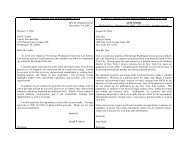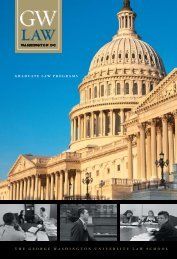The Bulletin - George Washington University Law School
The Bulletin - George Washington University Law School
The Bulletin - George Washington University Law School
- No tags were found...
You also want an ePaper? Increase the reach of your titles
YUMPU automatically turns print PDFs into web optimized ePapers that Google loves.
Litigation and Dispute Resolution ProgramCo-directors A. Robinson, S. SaltzburgGRADUATE PROGRAMS 33LL.M. in Litigation and Dispute Resolution<strong>The</strong> College of Trial Advocacy (6683) and 21 credits from the following courses arerequired.Advanced Trial Advocacy (6675)Mediation and Alternative DisputeResolution (6676)Pre-Trial Practice in Civil Cases (6677)Ethics in Adjudication and Settlement(6678)Advanced Evidence (6679)<strong>The</strong> American Jury (6680)Negotiation and Conflict ManagementSystems Design (6681)International Dispute Resolution (6682)Pre-Trial Practice in Criminal Cases (6684)Arbitration (6685)Because the courses in the Litigation and Dispute Resolution program are evaluatedsolely on the basis of the student’s performance in class, regular class attendance isrequired and is necessary for successful work in <strong>Law</strong> 6675 through 6685. Studentsshould consult the syllabus for each course for information on the instructor’sexpectations relating to participation and attendance. Upon the instructor’s finding thata student’s class participation or attendance has been deficient, and after the instructorfirst attempts to communicate with the student, a grade of No Credit (NC) will beentered unless the student can demonstrate to the satisfaction of the program directorsthat the absences were for good reason and beyond the student’s control. In such a case,the student will be withdrawn administratively from the course. In all other cases, thegrade of NC will remain on the record, though the student will continue to have theoption of repeating the course at its next offering by registering and paying tuition.National Security and U.S. Foreign Relations <strong>Law</strong> ProgramCo-directors L. Dickinson, G. Maggs, P. Raven-Hansen; Senior Adviser L. SchenckLL.M. in National Security and U.S. Foreign Relations <strong>Law</strong>A minimum of 14 credit hours from the following courses is required,* including 2credits graded on the basis of a research paper. <strong>The</strong> research paper must be at least 8,000words in length and U.S. <strong>Law</strong> <strong>School</strong> graduates must achieve a minimum grade of B+.All students must complete National Security <strong>Law</strong> (6870) and U.S. Foreign Relations <strong>Law</strong>(6871). For students who choose to write a thesis, <strong>The</strong>sis (6690-91) and a minimum of10 credits from the following courses are required.Computer Crime (6369)<strong>Law</strong> of Separation of Powers (6384)Congressional Investigations Seminar(6420)Information Privacy <strong>Law</strong> (6486)International <strong>Law</strong> (6520)International Litigation (6528)Immigration <strong>Law</strong> I (6538)Refugee and Asylum <strong>Law</strong> (6540)International <strong>Law</strong> of Human Rights(6546)Regional Protection of Human Rights(6547)Space <strong>Law</strong> (6548)<strong>Law</strong> of the Sea (6550)<strong>Law</strong> of War (6552)U.S. Export Control <strong>Law</strong> and Regulation(6553)International Criminal <strong>Law</strong> (6554)


